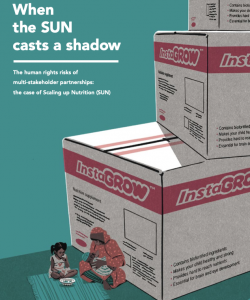
When the SUN casts a shadow
The recent research study aims to highlight the risks on human rights inherent in the multi-stakeholder models by exploring the case of the Scaling-Up Nutrition (SUN) initiative’s structure and approach. Using the holistic conceptualization of the right to adequate food and nutrition as an overarching framework, the study assesses the impact of policies and interventions promoted and/or inspired by SUN, as well as SUN as an institution from a governance perspective. Findings are based on primary data collected in Uganda, Guatemala and India, in addition to a comprehensive review of secondary sources.
The past two decades exposed an increased interest and participation of the private sector, and in particular large transnational corporations, in global policy debates on sustainable development and its many domains. Such stronger corporate engagement has generated, and continues to generate, polarizing perspectives, from the enthusiasm of those that view this as an opportunity for greater policy effectiveness and resource mobilization, to those concerned about corporate capture of the public policy space. This phenomenon has also been accompanied by the emergence of the term ‘stakeholder’ and increased use of ‘multi-stakeholder’ dialogues, programmes, platforms and partnerships. These models provide a conduit for the private sector - including large food and agribusiness - to participate as ‘key stakeholders’ in policy making fora related to food and nutrition, shifting away from the participation based on the differenciation between rights’ holders and third parties.
This study chooses the Scaling Up Nutrition (SUN) initiative as the prominent example of "multistakeholderism" within the food and nutrition arena to explore how this shift in governance influences public policy spaces; the framing of agendas; the capacity and political will of governmental and intergovernmental institutions (such as the UN) to regulate in the public interest; and people’s ability to claim their human rights.
Building on the results found, the study finalizes by outlining some policy recommendations for national governments, donors, UN agencies and civil society calling for a shift in direction and alignment of nutrition policy with the right to adequate food and nutrition and a people-centred approach, calling upon the necessity to restore the centrality of public policy spaces, at all levels, with robust safeguards against conflict of interest, in terms of integrity of the policy process, financial independency from private sources, including philanthropy, and trustworthiness of the knowledge and evidence used for policy making.
'When the SUN casts a shadow' was published by FIAN International, IBFAN and Society for International Development (SID) with the support of Open Society Foundation, Bread for the World, and Misereor. You can also read the Brief of the study here.
